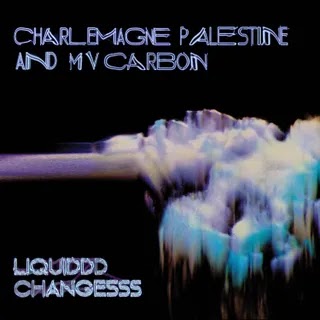On piano and cello, this cross-generational drone partnership finds common ground in the desire to explore the fundamental malleability of sound.
For Charlemagne Palestine and MV Carbon, sound is a malleable object, something to mold and sculpt. As Palestine once said, “I have always felt and heard and mixed the sounds in my world as liquids, not as solids. Sonic liquids are material that is endlessly transformable.” On their first collaborative album, Liquiddd Changesss, Carbon’s cello swirls and shifts alongside Palestine’s piano riffs, like liquid becoming ice in the cold or steam in the heat. They draw from their backgrounds in drone and noise to make music that often feels psychedelic and anguished, probing darkness to find radiance. A cross-generational partnership—Palestine began playing in the 1960s, while Carbon came up in the ’90s—the two artists find common ground in their shared desire to play with sound’s physicality.
Drawn from two hours of sessions recorded at Palestine’s Brussels studio in 2015, Liquiddd Changesss undulates between lengthy, cavernous drones and hollow echoes. The opening “Evaporated Whispers” clocks in at 19 minutes, manifesting a state of continual growth. In concert, Palestine is known for quaffing brandy while he plays, and here, his rattling snifters and dramatic strumming—a technique in which he holds the piano’s sustain pedal down as he hammers at the keyboard, forming an array of overtones—crash into Carbon’s gravelly cello. Those thunderous few minutes feel turbulent and fulsome, but they dissolve into muted squeals and nervous tremolos. Elsewhere, gossamer shimmers and quiet whispers become screams. The two musicians never stay in one place for too long—their sound is always on the move, ready to morph at the drop of a hat.
One of those metamorphoses is the movement between rich sound and eerie quietude. The music is often loud and resonant, but their more scattered textures are less cohesive. “Crushed Little Gem” builds from bouncy, echoing plucks and abstract vocal cries, a desolate sound that evokes an arid desert; piano pulses, guttural wails, and harsh cello tones pop out of the fold, creating spiky patterns. The draw of Carbon and Palestine’s music is its densely woven layers and naturalistic motion, but here, their sounds drift aimlessly.
With “Glass From Sand,” however, they achieve more hypnotic effects. Built from tumultuous piano and glowing cello, the track bubbles with energy. The pace and dynamics increase as they play, growing from a suspended drone into agitated trembling. The instrumentation harkens back to the album’s opener, but here it feels more unsettled: Palestine’s piano rumbles with nervousness while Carbon’s restless cello slides and quivers, swirling around a steady electronic glimmer. Even as the tension fades, a sense of darkness remains, a fretful energy that signals deep unease.
Despite its abstracted nature, at its best, Carbon and Palestine’s music uncovers intense emotional depths. Harrowing feelings simmer among the music’s twists and turns, threaded inside each wavering tone. The duo’s music is like a sculpture that’s being crafted in real time, never reaching its final form. Their sound is always evolving, always plunging even further into the unknown.



0 comments:
Post a Comment